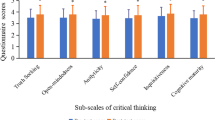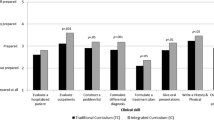Abstract
Aim: To assess the influence of a graduate-entry PBL curriculum on individual learning style; and to investigate the relationship between learning style, academic achievement and clinical reasoning skill.
Method: Subjects were first-year medical students completed the Study Process Questionnaire at the commencement, and again, at the end of the academic year when they also completed the Diagnostic Thinking Inventory, a measure of clinical reasoning skill. Subjects were classified on the basis of their predominant learning approach, and this was correlated with examination results and DTI score.
Results: There was a net shift in predominant learning approach away from deep learning towards a more surface approach over the period of the study, as well as a significant decrease in deep-learning scores. There was a statistically significant association between deep learning score and clinical reasoning skill as shown by total DTI score as well as on the structure of knowledge subscale. No correlation was found between learning approach and examination results.
Conclusion: Although these results suggest that a deep learning approach may be beneficial in the development of clinical reasoning skill through its potential to enhance the development of knowledge representations, the substantial shift towards a surface learning approach brings into question previous conclusions that PBL curricula foster a deep approach to learning, and suggests that other factors, such as work load may be more determinants of learning approach than curriculum type. Taken together, these findings emphasise the context-dependent nature of learning approach as well as the importance of assessment as a driver of student learning and strongly suggest that further work to determine precisely the factors which influence learning approach in medical students is urgently needed.
Similar content being viewed by others
References
M. Albanese (2000) ArticleTitleProblem-based learning: why curricula are likely to show little effect on knowledge and clinical skills Medical Education 34 IssueID9 729–738 Occurrence Handle10.1046/j.1365-2923.2000.00753.x
S. Allen G. Norman L. Brooks (1992) ArticleTitleExperimental studies of learning dermatological diagnoses: the impact of examples Teaching and Learning in Medicine 4 35–44
H.S. Barrows R.M. Tamblyn (1980) Problem-Based Learning: An Approach to Medical Education Springer Publishing Co New York
J. Biggs (1987) Student Approaches to Learning and Studying Australian Council for Educational Research Camberwell, Victoria
J. Biggs D. Kember D. Leung (2001) ArticleTitleThe revised 2-factor study process questionnaire:R-SPQ-2F British Journal of Educational Psychology 71 133–149 Occurrence Handle10.1348/000709901158433
P. Blumberg J. Michael (1992) ArticleTitleThe development of self-directed learning behaviours in a partially teacher-centred, problem-based learning curriculum Teaching and Learning in Medicine 4 3–8 Occurrence Handle10.1080/10401339209539526
G. Bordage (1994) ArticleTitleElaborated knowledge: a key to successful diagnostic thinking Academic Medicine 69 IssueID11 883–885
G. Bordage J. Grant P. Marsden (1990) ArticleTitleQuantitative assessment of diagnostic ability Medical Education 24 IssueID5 413–425
H. Boshuizen H. Schmidt I. Wassamer (1994) Curriculum style and the integration of biomedical and clinical knowledge P. Bouhuijs H. Schmidt H. Berkel Particlevan (Eds) Problem-Based Learning as an Educational Strategy Network Publications Maastricht, The Netherlands 33–42
R. Catrambone K. Holyoak (1989) ArticleTitleOvercoming contextual limitations on problem-solving transfer Jouranl of Experimental Psychology–Learning Memory Cognition 15 1147–1156
C.R. Cole (1985) ArticleTitleDifferences between conventional and problem-based curricula in their students’ approaches to studying Medical Education 19 IssueID4 308–309
C.R. Cole (1990) ArticleTitleElaborated learning in undergraduate medical education Medical Education 24 IssueID1 14–22
J. Colliver (2000) ArticleTitleEffectiveness of problem-based learning curricula: research and theory Academic Medicine 75 IssueID3 259–266
Custers, E., Boshuizen, H. & Schmidt, H. (1993). The influence of typicality of case description on subjective disease probability estimates, Paper presented at the Annual Meeting of the American Educational Research Association Atlanta, GA
M. Volder Particlede H. Schmidt J. Moust W. Grave Particlede (1986) Problem-based learning and intrinsic motivation J. Berchen Particlevan der T. Bergen E. Bruyn Particlede (Eds) Achievement and Task Motivation Swets and Zeitlinger and Swets, North America Lisse, The Netherlands
D. Dolmans H. Schmidt (1996) ArticleTitleThe advantages of problem-based curricula Postgraduate Medical Journal 72 IssueID851 535–538
A. Elstein L. Shulman S. Sprafka (1978) Medical Problem Solving: An Analysis of Clinical Reasoning Harvard University Press Cambridge, MA
K.W. Eva (2003) ArticleTitleOn the generality of specificity Medical Education 37 IssueID7 587–588 Occurrence Handle10.1046/j.1365-2923.2003.01563.x
R. Glaser (1991) ArticleTitleThe maturing of the relationship between the science of learning and cognition and educational practice Learning and Instruction 1 3–8 Occurrence Handle10.1016/0959-4752(91)90023-2
D. Godden A. Baddeley (1975) ArticleTitleContextual dependent memory in two natural environments British Journal of Psychology 66 325–331
L. Gow D. Kember (1990) ArticleTitleDoes higher education promote independent learning? Higher Education 19 307–322 Occurrence Handle10.1007/BF00133895
J. Hill I.E. Rolfe S.A. Pearson A. Heathcote (1998) ArticleTitleDo junior doctors feel they are prepared for hospital practice? A study of graduates from traditional and non-traditional medical schools Medical Education 32 IssueID1 19–24 Occurrence Handle10.1046/j.1365-2923.1998.00152.x
Hmelo, C.E. (1995). The Effect of Problem-based Learning on the Early Development of Medical Expertise, Paper Presented at The American Educational Research Association Annual Meeting. San Francisco, CA
J. Kruger D. Dunning (1999) ArticleTitleUnskilled and unaware of it: how difficulties in recognizing one’s own incompetence lead to inflated self-assessments Journal of Personality and Social Psychology 77 IssueID6 1121–1134 Occurrence Handle10.1037/0022-3514.77.6.1121
H. Mandin A. Jones W. Woloschuk P. Harasym (1997) ArticleTitleHelping students learn to think like experts when solving clinical problems Academic Medicine 72 IssueID3 173–179
M. McParland L.M. Noble G. Livingston (2004) ArticleTitleThe effectiveness of problem-based learning compared to traditional teaching in undergraduate psychiatry Medical Education 38 IssueID8 859–867 Occurrence Handle10.1111/j.1365-2929.2004.01818.x
S.P. Mennin S. Kalishman M. Friedman D. Pathak J. Snyder (1996) ArticleTitleA survey of graduates in practice from the University of New Mexico’s conventional and community-oriented, problem-based tracks Academic Medicine 71 IssueID10 1079–1089
G.T. Moore S.D. Block C.B. Style R. Mitchell (1994) ArticleTitleThe influence of the New Pathway curriculum on Harvard medical students [see comments] Academic Medicine 69 IssueID12 983–989
D.I. Newble R.M. Clarke (1986) ArticleTitleThe approaches to learning of students in a traditional and in an innovative problem-based medical school Medical Education 20 IssueID4 267–273 Occurrence Handle10.1111/j.1365-2923.1986.tb01365.x
G. Norman (2005) ArticleTitleResearch in clinical reasoning: past history and current trends Medical Education 39 IssueID4 418–427 Occurrence Handle10.1111/j.1365-2929.2005.02127.x
V.L. Patel G.J. Groen G.R. Norman (1991) ArticleTitleEffects of conventional and problem-based medical curricula on problem solving Academic Medicine 66 IssueID7 380–389
L. Ross R. Nisbett (1991) The Person and the Situation: Perspectives in Social Psychology McGraw-Hill New York
H. Schmidt (1982) Activation of Prior Knowledge, Intrinsic Motivation and Text Processing Van Walraven Apeldoorn
D.T. Sobral (1995) ArticleTitleDiagnostic ability of medical students in relation to their learning characteristics and preclinical background Medical Education 29 IssueID4 278–282
R.E. Thomas (1997) ArticleTitleProblem-based learning: measurable outcomes Medical Education 31 IssueID5 320–329 Occurrence Handle10.1046/j.1365-2923.1997.00671.x
P.P.J.L. Verkoeijen R.M.J.P. Rikers H.G. Schmidt M.W.J. Wiel Particlevan de J.P. Kooman (2004) ArticleTitleCase representation by medical experts, intermediates and novices for laboratory data presented with or without a clinical context Medical Education 38 IssueID6 617–627 Occurrence Handle10.1046/j.1365-2923.2004.01797.x
D.T. Vernon R.L. Blake (1993) ArticleTitleDoes problem-based learning work? A meta-analysis of evaluative research Academic Medicine 68 IssueID7 550–563
D. Watkins J. Hattie (1985) ArticleTitleA longitudinal study of the approach to learning of Australian tertiary students Human Learning 4 IssueID2 127–142
N.N. Woods L.R. Brooks G.R. Norman (2005) ArticleTitleThe value of basic science in clinical diagnosis: creating coherence among signs and symptoms Medical Education 39 IssueID1 107–112 Occurrence Handle10.1111/j.1365-2929.2004.02036.x
Author information
Authors and Affiliations
Corresponding author
Rights and permissions
About this article
Cite this article
Groves, M. Problem-Based Learning and Learning Approach: Is There a Relationship?. Adv Health Sci Educ Theory Pract 10, 315–326 (2005). https://doi.org/10.1007/s10459-005-8556-3
Received:
Accepted:
Issue Date:
DOI: https://doi.org/10.1007/s10459-005-8556-3




